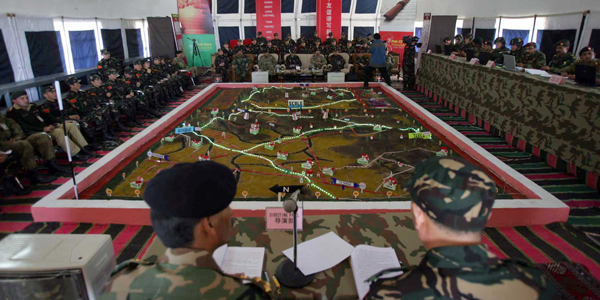Why Pakistan Can't Turn China Against the U.S.
The U.S. and China appear to be on the same team when it comes to Pakistan's nuclear weapons program, suggesting cooperation between the two powers on global security threats
There's a piece of good news in Marc Ambinder and Jeffrey Goldberg's otherwise quite scary Atlantic-National Journal cover story on the deterioration of U.S.-Pakistan relations. No, it's not about Pakistan, which has taken to shuttling nuclear weapons materials around Pakistani highways in unmarked and unprotected vans. It's not about Afghanistan, where the U.S. and Pakistan have increasingly divergent interests and strategies. It's about China.
Here's the background: Pakistan has been courting China recently in an apparent attempt to hedge against (and give a warning to) the U.S. Two of Pakistan's likely assumptions are that China and the U.S. have conflicting interests in Pakistan, and that privileging one will pit it against the other. These aren't strictly crazy assumptions: China has shown every willingness to work with pariah or terrorism-supporting states, such as Iran and Burma and Sudan; China has a policy of non-interference in other nations, even ones with very irresponsible and violent governments; and Chinese and American influence in Asia can sometimes appear mutually exclusive, or at least competitive.
Here's the news: Pakistan's nuclear weapons program appears to be one very important area where the U.S. and China are on the same team. Despite Pakistan's attempt to resist American influence by replacing its current sugar daddy with a new, Chinese one, it appears that China would actually not mind a little U.S. interference. Goldberg and Ambinder report:
Pakistan's military chiefs are aware that America's military has developed plans for an emergency nuclear-disablement operation in their country, and they have periodically threatened to ally themselves with China, as a way to undercut U.S. power in South Asia. In a recent statement quite obviously meant for American ears, Pakistan's prime minister, Yousuf Raza Gilani, described the Pakistani-Chinese relationship as "higher than the mountains, deeper than the oceans, stronger than steel, and sweeter than honey." But China, too, is worried about Pakistan's stability, and has recently alleged that Pakistan has harbored Uighur separatists operating in western China. According to American sources, China has, in secret talks with the U.S., reached an understanding that, should America decide to send forces into Pakistan to secure its nuclear weapons, China would raise no objections. (An Obama-administration spokesperson had no comment.)
During the Cold War, the assumption that every state in the world would align itself with either the U.S. or the Soviet Union was so entrenched that some nations tried (and failed) to buck the trend with a "non-aligned" movement. The U.S. and China are obviously not in anything resembling cold war, but listening to the Republican presidential candidates you could sometimes get the impression that some American political leaders believe we might be headed that way. This small bit of cooperation between the U.S. and China against a possible third-party threat suggests that we the world may actually be moving toward a more cooperative U.S.-China relationship rather than one of greater competition.
Both the U.S. and China, despite their vastly different approaches to foreign policy, share a common interest in maintaining a basically stable world. This is something the U.S. and Soviet Union never really shared; the two super-powers often fomented instability (in, for example, Afghanistan) to hurt the other. But as China rises, it is becoming more reliant on global stability -- its booming economy is driven by manufacturing, which is built upon a pan-Asian supply chain that stretches across the continent and into Africa. Violence or other instability anywhere along that supply chain poses a real threat to China. In May, for example, Chinese media estimated $18.8 billion in losses from the conflict in Libya.
As China's interests become more global and more reliant on global security, we might expect more policies like the one Goldberg and Ambinder noted: a little less opposed to Western interference, a little more willing to curb global bad actors, and wary of the kinds of anti-American games that Pakistan seems to want it to play.
